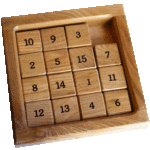
Space is considered to be the framework of the universe, and is fixed, just like we imagine the framework of a house, or a chess board.
It is thought that there is a finite size to a piece of space. It is called the Planck Length. It is super tiny.
Theories around quantum gravity try to make sense of how local pieces of space, super tiny, interact with each other. And how those interactions can be used to work out how quantum mechanics works.
I have a different idea. I don’t think space is fixed, I don’t think it is a frame work. I don’t think there is a framework at all.
- The universe is a sliding puzzle, but without edges
- Units of space are the puzzle pieces. They can move, but when one moves, another must take its place.
- Units of space carry particles, like an elephant in a dinghy
- Gravity works on units of space, and particles get a free ride.
- Gravity is a tow rope, units of spare are the dinghy, and the elephant is a particle
- Possibly gravity still works on the particle, and space comes with it
- Particles of space loosely cling together, and that is the observable universe
- Beyond that is emptiness, the framework of the universe that has nothing in it. The non-space.
- Not framework like a lattice, but a container like a bowl. Moving around inside it are units of space. They make it look like a lattice, like the pieces in a sliding puzzle
Of course space is 3D so think of a bowl full of marbles. Move one and another takes its place. But that doesn’t work well with a bowl of cubes, so there is perhaps a shape to these units of space. Which means they are either spheres, or many combine to make a shape (probably a sphere).
We could actually call a unit of space, a thing that can move, a Planck. Possibly this vessel that transports particles is a physical thing that incorporates all of the Planck constants? As in it has a mass and energy, and that needs to be deducted from the mass/energy that has been measure for the particles themselves. If that make equations work better, good! If not, the physical space thing doesn’t have mass or energy of its own (not so good, makes it less prove-able).
I don’t know how to research to find out if this has been thought of before. I do know that solution is bound to be very simplistic, which means an idiot like me could accidentally think of it 🙂
BONUS TIME
It just crossed my mind that if we involved time, then that would mean however long it took to traverse one Planck length at the speed of light is the minimum unit of time. Seems others have thought of this already (it is a bit obvious…) BUT with the above ideas it means that space actually has a peak velocity of the “speed of light”, and it carries the light.
This means that when we talk about space and time, they are more intertwined than ever before.
